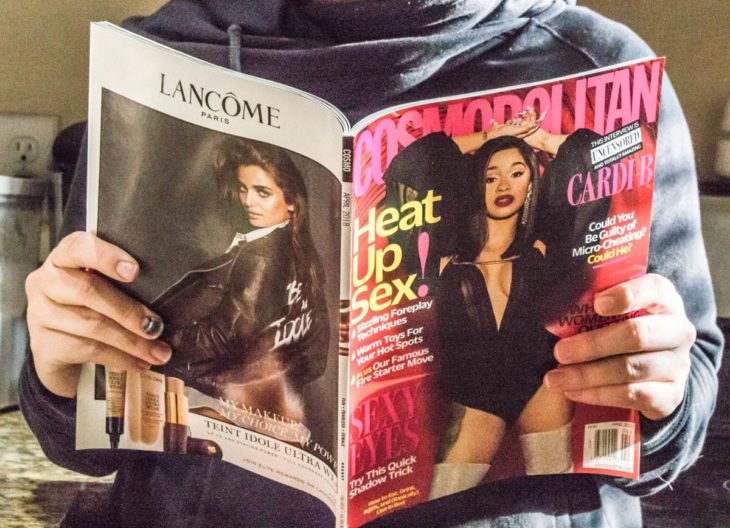I’m of the last generation to learn about sex without the help of the internet. While I was spared the misinformation my pre-teen mind would’ve encountered in her furtive Google searches, I also missed out on the comprehensive dialogue that today’s young people can access. Which might not be so bad, if I’d had access to any other trustworthy way to learn about sexuality.
Born in 1980 in small town Michigan, I was destined to come of age in a public school that breathed nary a word about birth control or masturbation or pleasure or sexually transmitted diseases. Was it abstinence-only? I can’t vouch for it being so on-a-dotted-line, but it certainly was, in fact: Health class focused on puberty’s effects on our bodies and, later, used a biopic of Karen Carpenter to encourage us not to develop eating disorders. We filled in the names of reproductive organs on a Xeroxed worksheet—most parts, anyway. “Clitoris” didn’t make it on the map.
Back home, my mom made a good faith effort to talk to me about sex. She brought it up abruptly while driving the minivan, and I was so shocked to hear her utter the word “sex” that nothing else registered. She was nervous. She used the expression “planting his seed.” I was confused.
Good thing my mom subscribed to Cosmopolitan — my saving grace. Sort of.

Source: uatrav
“America’s #1 Women’s Magazine” was full of women who smiled at me from rumpled bedsheets and headlines that blurted words I’d only heard in whispers at the bus stop. Not only did sexuality take primacy in its pages—serving up enough context for a curious kid to figure out the fundamentals—but it also unabashedly validated physical pleasure.
Huddled with Mom’s magazines in my bedroom, Cosmo taught me the words “orgasm” and “clitoris.” How long would it have taken me to understand the basics of my own body without it? Moreover, the women on the pages were positioned as leading characters in their own sexuality: acknowledging it, instigating it, and reveling in it. And while birth control wasn’t named in my sex ed, I could count on Cosmo to normalize it. Always, the magazine urged readers to use a condom every time. If it weren’t for a regular diet of Cosmopolitan, I would’ve grown up scarcely knowing the logistics of a condom, let alone knowing that when I chose to have sex, I’d have an array of contraception options.
I credit Cosmo for introducing me to a host of other fundamentals, from STDs to, well, what my mom meant by seed-planting. No doubt that the magazine is one of the best things to happen to my sex life (coming in not far behind, you know, having sex). But you won’t be surprised that using Cosmo as my primary tool in sex education was a mixed bag. Though it taught me the revolutionary idea that women’s sexual pleasure is important, it served up a rigid picture of what that pleasure looked like.

Source: chicagotribune
It began with the woman: she’s white, able-bodied, young, and, of course, totally hetero. The men (always men) she shared her sexuality with were, of course, the same. While Cosmo normalized sexual pleasure, its presentation of “normal” women whose sexuality varied no more than, say, doing it with a “normal” dude on a kitchen table, diminished the diverse possibilities of sexuality, while at the same time rendering an enormous number of people invisible.
When my relationships deepened sexually, I considered myself beyond the reach of Cosmo’s influence. But in truth, it had already got me. I found myself moving the way I thought I should. If it seemed I was taking too long on what Cosmo would call “the Big O,” I faked it. I’d never have named it this way at the time, but I presented myself to my partner in the way a Fun Fearless Female is supposed to look when she’s intimate. Parroting Cosmo’s presentation of sexuality was easier than figuring out what my own body was telling me and being patient through the fumbling of newness and experimentation.
Over time, as I had more experiences to call my own, as I learned to self-articulate, the hold of the Cosmo fantasy fell away—I have my own stories to negate the magazine’s narrative. I’m done feeling ashamed for not-knowing; rather, I’ll understand that sexuality on my own terms doesn’t mean I have to have all the terms hammered out before I begin. Whole-bodied pleasure is intelligent, important and sacred. I welcome it as my guide in the times of attentive experimentation, even in the fumbling, when all things are possible.
Original by: Anna Clark
